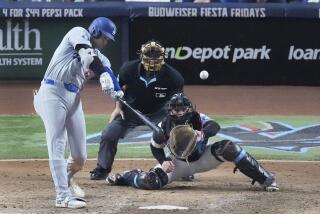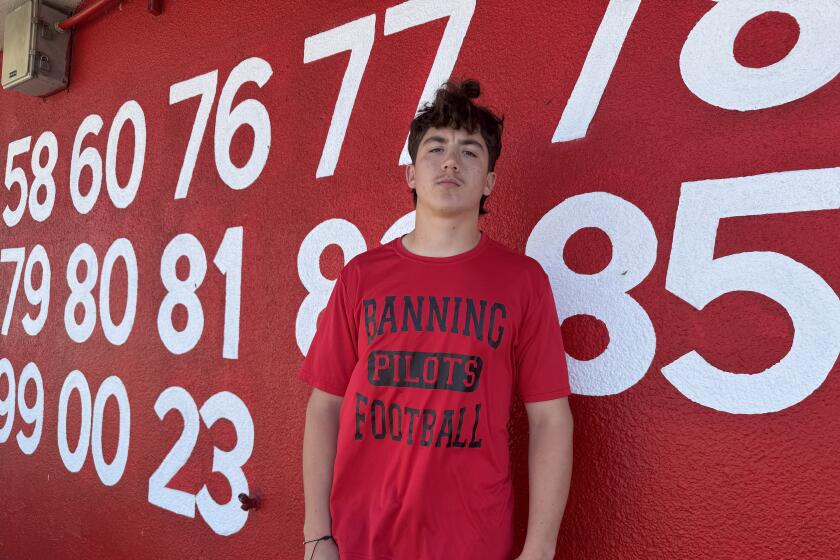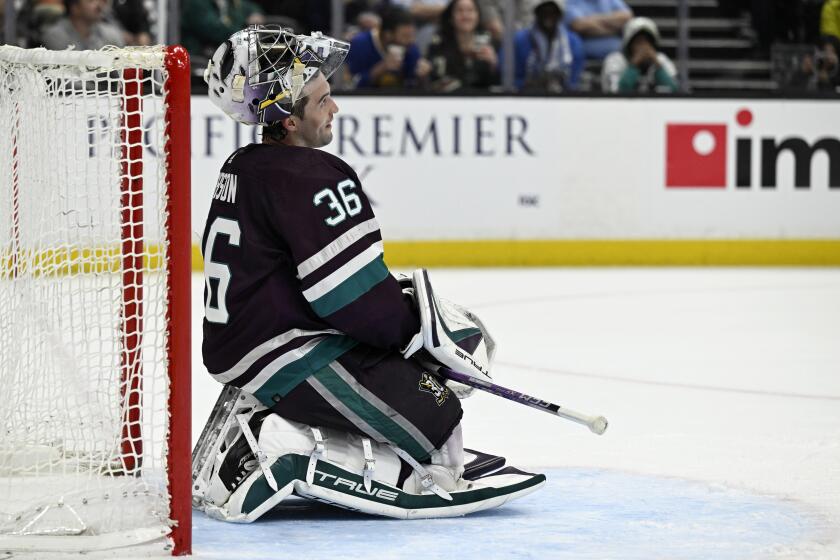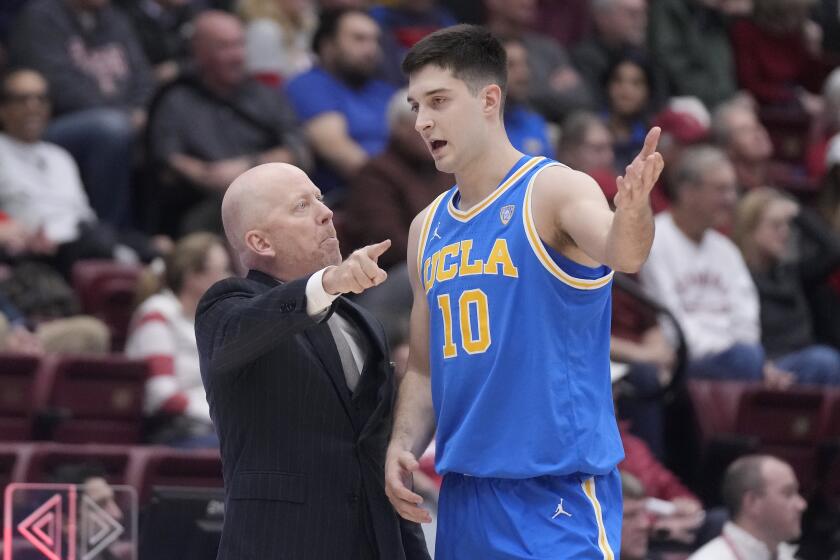SPECIAL REPORT: CRIME & SPORTS ’95 : The Year in Review Finds College Athletes in Middle of Maelstrom--Especially at Nebraska
In cavernous Cook Pavilion, the indoor practice facility for the top-ranked Nebraska football team, Coach Tom Osborne shifts his weight as he reflects upon a season of 11 victories, no defeats and more questions about dubious behavior than a Whitewater hearing.
“I don’t know,” Osborne says slowly, looking away. “Maybe I’m so far out of step with society that I don’t belong in coaching.”
After 23 years as one of college football’s most exemplary coaches, it has come to this. Even in America’s heartland, where many in the state would rather talk about the Cornhuskers’ showdown Jan. 2 with No. 2 Florida in the Fiesta Bowl, the specter of criminal activity among athletes has prompted the coach and others on campus to consider what has gone wrong with the football program. In what should have been a season of nothing but positives, a Heisman Trophy candidate and two other players were charged with crimes ranging from assaults to stealing to second-degree murder.
This is a community in which acts of violence are rare, and interim Chancellor Joan Leitzel said the school once treated athletes as it did other students.
“Now we are asking ourselves, can we handle their misconduct in the same way?” Leitzel said.
Incoming Chancellor James Moeser, now at the University of South Carolina, said the answer is no.
“We train them to be good football players and also must educate them to the art of living with normal conduct,” he said.
But the question continues to reverberate on campuses throughout the nation as crimes among athletes attract more and more attention.
A Times study found that 209 of 345 U.S. or Canadian athletes and team personnel involved in police incidents in 1995 were from colleges.
College coaches and administrators are asking themselves whether they should bring athletes to their campuses who already represent the educational standards, values and aims of the universities, or assist those who might be out of their element academically and socially in reaching those goals.
In Idaho, officials have acted decisively. Last month, the state board of education adopted strict guidelines regarding criminal activity involving athletes at Idaho, Idaho State, Boise State and Lewis-Clark State.
The policy’s cornerstone is a disclosure statement, requiring athletes to acknowledge all past criminal behavior before competing. Coaches are no longer allowed to recruit athletes who have committed felonies or, in cases of juvenile proceedings, acts that would have constituted a felony.
Furthermore, any student convicted of a felony while attending a state school will not be allowed to participate again in intercollegiate athletics.
The strict policy was the board’s answer to revelations published in the Idaho Statesman newspaper that dozens of Idaho college athletes had been in trouble since 1992.
“This came out of frustration,” said Michael Larsen, the board’s deputy attorney general. “Athletes, like everybody else, have to realize there are consequences for [bad behavior].”
UCLA athletics changed 15 years ago, after one of its star football players, Billy Don Jackson, pleaded guilty to involuntary manslaughter in the fatal stabbing of a West L.A. drug dealer. During sentencing, a judge called Jackson, who played at UCLA for two seasons before transferring to San Jose State, a functional illiterate.
Since that troublesome disclosure, UCLA has established stringent recruiting standards for its coaches.
“From that point, we shifted philosophies,” recently departed football coach Terry Donahue said.
UCLA police chief Clarence Chapman began a mentor program 18 months ago, through which officers get to know football players and serve as role models.
Chapman said he started the program because athletes had a disproportionate number of contacts with UCLA police. Those contacts were not always crime related, but Chapman wanted to build a strong relationship with the athletes. Two officers accompanied the Bruin football team to Hawaii for the Aloha Bowl.
The positive is that at least some schools are addressing the issue.
“I can’t recall in any Big Ten presidents’ meetings or Atlantic Coast Conference meetings a discussion of this issue five years ago,” said Robert O’Neil, former president at Virginia and the Wisconsin statewide system.
But except for a few isolated examples, the situation has not changed significantly from the 1980s, when Colorado athletes had so many problems in Boulder that campus police would get a couple of game programs at the first home football game of the season.
“Saves you time,” detective Tim DeLaria said then. “Instead of having a victim go through the mug book, you just take out your program and say, ‘Is he in here?’ ”
The recent recruiting of New York prep basketball star Richie Parker raised questions of campus integrity. Parker was sentenced last Jan. 13 to five years’ probation for first-degree sexual abuse of a teen-age classmate.
Ten days after Parker had pleaded guilty, Seton Hall, under heavy criticism, withdrew its scholarship offer to him. Utah then considered Parker, but was caught in the maelstrom when assistant coach Donnie Daniels suggested that Parker might suffer more than his victim because of the publicity he was receiving.
Parker then was wooed by a third Division I basketball program, George Washington, which also eventually withdrew its scholarship offer. And when the school then offered the victim a scholarship, angry faculty members called it a public-relations stunt gone awry.
Parker finally found a home at Mesa Community College in Arizona. But school administrators rejected his scholarship and basketball Coach Rob Standifer was asked to resign when they learned about Parker’s past. Parker is attending classes at Mesa but not competing.
“If the person has a record or behavioral problems, it’s not a problem as long as they have the [grade-point average] and can shoot the ball,” Angela Beck, Nebraska women’s basketball coach, said facetiously.
“We are recruiting athletes, not people, and then expecting them to act [decently].”
*
Madeline Popa, president of Nebraska NOW and a student at the university, sits in a Lincoln coffeehouse, shaking her head while recalling the reaction to the football scandal that has engulfed this state capital.
“This is the United States, this is Nebraska, the middle of the country,” Popa says. “How is it possible that people care more about football, which is still a game, than the welfare of a human being?”
Popa, a Romanian immigrant, represents a small segment in the state that is disappointed with Osborne’s handling of his players, particularly the highly charged case involving running back Lawrence Phillips of West Covina.
Phillips, a preseason Heisman candidate, was suspended in September after being charged with beating basketball player Katie McEwen, a former girlfriend. He was allowed to rejoin the team six weeks later after pleading no contest to misdemeanor assault and trespassing. He will make his first start in almost three months against Florida, Osborne announced Tuesday.
According to published reports, McEwen suffered a head cut and bruises when Phillips pulled her from the apartment of Scott Frost, another Cornhusker football player, at 4 o’clock one morning. The reports said that Phillips dragged McEwen down several flights of stairs and banged her head against a metal mailbox.
In allowing Phillips to rejoin the team, Osborne said Phillips had fulfilled his obligations to the legal system. He also said during a news conference that he would not characterize what happened as a beating.
“The woman was thrown down five stairs and had her head hit against a mailbox,” Popa said. “If the coach doesn’t call that a beating, then how can you deal with the issues?
“The coaches say the player made a mistake. An act of violence is not a mistake.”
Osborne, not known as a win-at-all-costs coach, has faced as much scrutiny as his players this season over incidents that have occurred in the last four years. He points out that although a few players have been in trouble in recent years, there is a misperception that he leads a group of renegades.
His teams have not been targeted for academic deficiencies, major NCAA violations or outlandish behavior on the field. He said one or two criminal cases a year among 120 players does not constitute a problem.
“Tom doesn’t really know there is a problem because no one ever brought it up,” said a university official who asked not to be identified.
Perhaps the most explosive allegations to come out of the Nebraska affair, however, accuse Osborne and his staff of obstructing justice to help players.
Riley Washington, a junior wingback, was charged with second-degree attempted murder after a shooting at a convenience store last August. Osborne, one of the state’s most influential figures, made public statements proclaiming Washington’s innocence, and today says the player did nothing wrong. Washington has pleaded innocent and is awaiting trial.
Tyrone Williams, a senior cornerback, was charged in March, 1994, with felonies involving a shooting three months earlier. Before Williams was charged, Osborne admitted that one-time Nebraska assistant Kevin Steele was given Williams’ gun. Steele and Osborne locked it in a cabinet. Osborne said the campus police knew about it.
“I don’t tell Tom Osborne how to run the football department,” Lancaster County Attorney Gary Lacey told Sports Illustrated in September. “He should stay out of the criminal justice system. He hasn’t done that at all.”
Lacey complained Osborne has interviewed witnesses in criminal cases, taken public stands supporting his players’ innocence and attacked the credibility of those testifying against the athletes.
According to published reports, Osborne talked to McEwen, Phillips’ victim, before Lacey did.
Some see these actions as all but condoning bad behavior.
“We’re telling student-athletes who have the privilege, the honor, to wear red and white that there will be special treatment,” said Beck, McEwen’s coach.
Still, the Nebraska administration defends Osborne.
“In his mind, if the decision ever is what’s in the best interest of the student versus what is in the best interest of the program or the university, he will always choose on behalf of the student,” Leitzel said.
Osborne’s program isn’t the only one that experienced multiple police incidents in 1995.
Tennessee faced numerous problems. Football player Travis Cozart was indicted for allegedly selling cocaine and crack to undercover agents, and earlier had been fined for assault. Football player Leslie Ratliffe was put in a 90-day pretrial diversion program and ordered to undergo domestic counseling for assaulting a former girlfriend.
And Osborne is not the first coach accused of overzealous support of his players. In 1986, police on the scene at College Park, Md., shortly after Maryland All-American basketball forward Len Bias’ death of a cocaine overdose said they believed that Coach Lefty Driesell had interfered with the investigation.
Later, a Prince George’s County grand jury heard charges that Driesell had obstructed justice by meeting with his team hours after the death and coaching players on what to say to investigators. The grand jury did not indict Driesell.
Cedric Dempsey, NCAA executive director, encourages athletic departments to allow university administrators and, in criminal cases, prosecutors, to handle all situations. He said a coach’s responsibility ends when either laws or campus codes of conduct are violated.
The NCAA has no national guidelines on behavior, Dempsey said, because it cannot offer due process or police criminal activity. But the college organization will prohibit athletes-only dormitories for Division I schools beginning in July.
Such residences have symbolized the special treatment afforded athletes and are widely considered breeding grounds for misbehavior. NCAA officials believe that athletes will be more socialized if they are integrated into the general student population.
*
On fall Saturday afternoons in Lincoln, Memorial Stadium becomes Nebraska’s third-largest city. It becomes a sea of red-and-white-clad fans whose sect-like devotion to the ‘Huskers is a human phenomenon.
And when he steps onto the field, larger than life, Tom Osborne, 58, is their deacon.
For him, the debate over criminal activity has been internal. Should he boot players to send a message?
Or show flexibility?
“Our jails are full and yet we’re not putting much dent in crime,” he said one cold December evening. “My orientation is, if we can rehabilitate somebody, let’s do it. Let’s not throw them on the human scrap heap until they’ve really proven they are incorrigible.”
Osborne said that philosophy has worked with Christian Peter, the team’s senior captain who was sentenced to 18 months’ probation in May, 1994, after pleading no contest to a charge of third-degree sexual assault brought by former Miss Nebraska Natalie Kuijvenhoven, then a student.
Peter, a 6-foot-2, 290-pound defensive tackle, also was arrested five times from 1991 through ’93 for exposing himself to a female student, urinating in public and failing to comply with a police officer’s orders, among other indiscretions.
Since then, two other women have alleged sexual assault and harassment against Peter, although no charges were filed.
One of the women filed a civil complaint against the school and Peter. The complaint alleged Peter sexually assaulted and raped her and the school did not take her complaints seriously because the defendant played football. The suit also alleged she was forced to leave the Lincoln campus after being harassed and threatened for leveling the allegations.
The school denied those charges.
Osborne said he sat Peter down and said, “We’re not going to have any more. You’re not going to go to bars, you’re not going to use alcohol anymore.”
Since then, Peter has been a model student, Osborne said.
So, he added, has Tyrone Williams, the player charged in connection with a shooting.
“I said, ‘Tyrone, no more drinking,’ ” Osborne said. “‘Any more trouble, you’re gone.’
“With Phillips, I told him, ‘This is what you’ve got to do. You’ve got to take responsibility for what you did. You have to enter treatment. If you do these things, you can earn your way back on the team.’ ”
Osborne, who recently completed his third consecutive undefeated regular season, complained that if he cared only about winning, he would have started Phillips when the player rejoined the team, although he now will start in the national championship game.
“It seems like we’re still holding to a standard that was prevalent in the ‘50s of what we expect of our athletic teams,” he said. “Maybe that is what it should be. I just know what reality is.
“I’ve got no place to send them. Where do I send Lawrence Phillips [who lived in a group home in junior high and high school]? Where do I send Tyrone Williams?”
The question is almost lost in Cook Pavilion’s vastness.
But Madeline Popa doesn’t think that should ever be the question.
“The coach owes Nebraskans a team that doesn’t have these problems,” she said.
THE STUDY
Times staff writers George Dohrmann, Houston Mitchell, Ara Najarian and Greg Sandoval and editorial library researcher Paul Singleton reviewed more than 2,500 Associated Press and Los Angeles Times articles to try to find every nationally reported police incident, court appearance or other development involving current professional or college athletes or team employees that occurred, was adjudicated or was settled between Jan. 1 and Dec. 15, 1995.
THE ELEMENTS
MIKE DOWNEY
Columnist Mike Downey points out that sports figures are increasingly making news in the real world. C3
DOMESTIC VIOLENCE
Scholars say that male athletes are more likely to be abusive toward women than other men are. C4
TROUBLED TIMES
Sports have provided a way out for many African American athletes who otherwise may have been caught in a life of crime. C5
More to Read
Go beyond the scoreboard
Get the latest on L.A.'s teams in the daily Sports Report newsletter.
You may occasionally receive promotional content from the Los Angeles Times.










